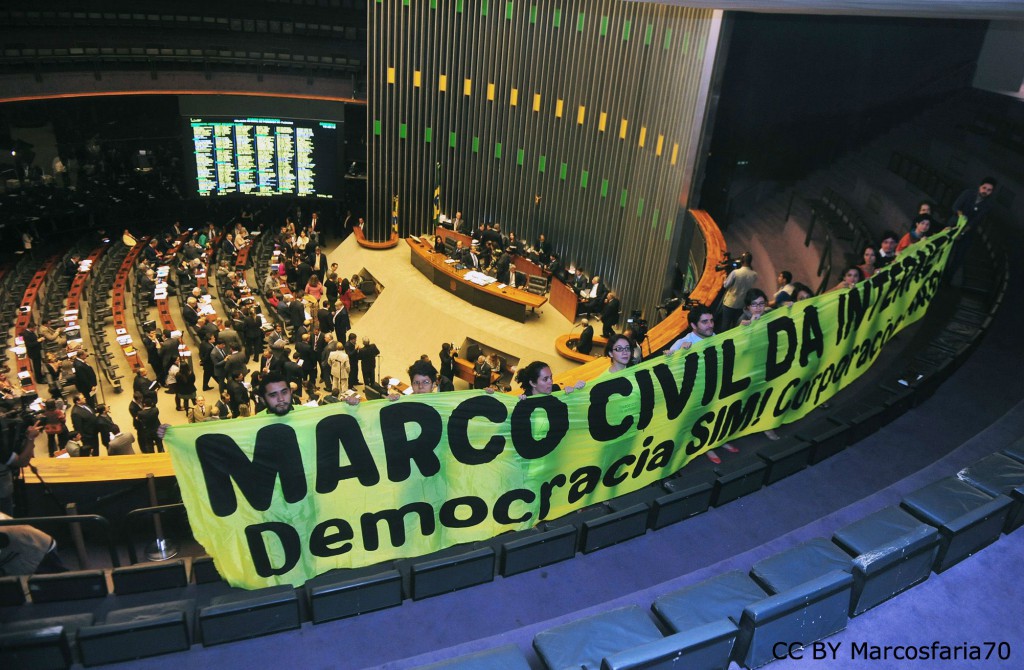Civil Rights Framework for Internet Use under discussion in the Inter-American Commission on Human Rights (IACHR)
by Digital Rights LAC on December 19, 2014
The Civil Rights Framework for Internet Use (Law 12,965 of 2014) was sanctioned by President Dilma Rousseff in April 2014 and deals with topics such as general principles, fundamental rights, liability of intermediaries and responsibilities of the government with regard to network use and development.
By Marília Maciel*
The law reinforces the assurance of principles and human rights provided in the Federal Constitution, such as freedom of expression and privacy, explaining how those rights should be applied to a digital environment. The Civil Rights Framework for Internet Use brings positive impacts for Internet regulation in Brazil, which justified its presentation as a successful case before the Inter-American Commission on Human Rights of the OAS, in a public hearing held on October 28, 2014.
The bill came as a response to an initiative of over-criminalization of online behaviors (PL 84/99), for example, the penalty of imprisonment for unlocking a mobile device. This criminalization trend is noticeable not only in Brazil, but throughout Latin America, and has a negative impact on human rights. The understanding of the Brazilian Government and civil society was that before criminalizing conducts it is necessary to develop a general understanding of the rights and clarify obligations.
As a general and comprehensive law, the Civil Rights Framework for Internet Use will certainly be an obligatory reference for the approval of subsequent laws, which should be in line with it. This means that several of the proposals that are being processed by the Brazilian Congress – many of them involving the criminalization of online behavior – should be in harmony with the rights and guarantees provided by the Civil Rights Framework for Internet Use. The law also mitigates the problem of the existence of conflicting court decisions in similar cases, increasing predictability and legal certainty. These conflicting decisions are harmful not only for individuals, but also create a not so favorable environment for innovation for the private sector. With the Civil Rights Framework for Internet Use clear rules are defined, such as the one that specifies the cases in which intermediaries (platforms and online services) will be accountable for content posted by third parties.
The Civil Rights Framework for Internet Use guides the interpretation and application of certain rights in the digital environment. It deals, for example, with the importance of the protection of meta-data, which is access data to the Internet or a service, to ensure privacy. The law recognizes this importance and establishes that the access to such data depends on a court order, a clear direction not only for the judiciary but for investigative bodies as well. It is essential to highlight the importance of the Government’s initiative for discussion and approval of laws such as the Civil Rights Framework for Internet Use. The Brazilian Ministry of Justice conducted the preliminary draft preparation process, with the support of FGV’s Center for Technology and Society, and actively participated in the negotiations in the congressional debate stage.
It was at the initiative of the Government that a public consultation was organized to develop the Civil Rights Framework for Internet Use in a participatory manner, through contributions made by interested players through the Internet itself. This reinforces and complements the traditional democracy, something important in young Latin American democracies. The mobilization of society to finally approve the Civil Rights Framework for Internet Use in Congress shows that even if there is a political disillusionment speech, society and social movements are interested and involved in the discussion of laws affecting their rights and the use of Internet.
After the law was passed, it was time to regulate some devices that were left open in the Civil Rights Framework for Internet Use. There will probably be debates in the courts on the interpretation of the law as well. The Civil Rights Framework for Internet Use is still under construction and dispute, which will require continued mobilization to make the rights set forth therein effective. Discussing the issue in international forums is important not only to disseminate good practices, but it is also a way to find common ground with the regulatory process in other countries and potential alliances that can assist in building capacities for the internal debate ahead.
*Coordinator of Center for Technology and Society at FGV’s Rio de Janeiro Law School (CTS/FGV).






